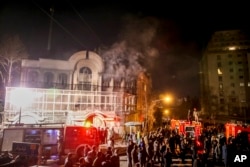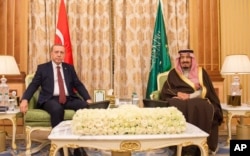Turkey is seeking to avoid being embroiled in the deepening crisis between Iran and Saudi Arabia. Following Saudi Arabia's execution of Shiite cleric Nimr al-Nimr and violent protests against the Saudi Embassy in Tehran, Ankara has been careful not to take sides.
The growing diplomatic crisis between Tehran and Riyadh is seeing Ankara perform a delicate balancing act.
Turkish Deputy Prime Minister Numan Kurtulmus issued a carefully worded statement condemning both the attack on the Saudi Embassy in Tehran and the execution of cleric Nimr al-Nimr. But President Recep Tayyip Erdogan said Wednesday the execution was an internal matter.
Uneasy balance
Political columnist Semih Idiz, of Turkey’s Cumhuriyet newspaper and Al Monitor website, says Ankara is in a tight spot.
"In a very difficult situation of course, there is not much love lost between Turkey and Iran at the moment, no doubt about that. But both countries have a sense of having to maintain their relations, and Turkey has a heavy dependence on Iranian energy. So there is a limit to which it can afford tensions with Iran to go. On the other hand, it has a new strategic relationship with Saudi Arabia," said Idiz.
Iran is only second to Russia in supplying natural gas to Turkey. Ankara is already in the middle of a diplomatic crisis with Moscow and is desperately seeking to diversify its energy dependency.
International relations expert Soli Ozel of Istanbul’s Kadir Has University says the regional rivalry with Tehran is already a major headache for Ankara.
"We have an undeclared contest, it is in Iraq, its in Syria certainly, and it may even be in Iraqi Kurdistan. And Iran and Russia are very closely working together," said Ozel.
Closer Saudi ties
But that competition with Tehran, in particular in Syria, with both sides backing opposite sides in the civil war, is widely seen as a factor why Ankara has recently embarked on a developing a strategic relationship with Riyadh.
Last month, Turkish President Erdogan committed Turkey to Saudi Arabia’s regional anti-terror alliance of Sunni countries.
But Carnegie Institute visiting scholar Sinan Ulgen says the deepening crisis between Riyadh and Tehran is a warning sign for Ankara.
"Given that Turkey is finding it difficult to get additional support in the region for its objectives in Syria, the relationship with Saudi Arabia has become critical. But this is certainly of an area of foreign policy in which Turkey must tread carefully, given that it should not be seen as yet another player in the Middle East that is willing to play the sectarian game," said Ulgen.
Turkish Prime Minister Ahmet Davutoglu, in line with Turkey’s Western allies, called Tuesday on Riyadh and Tehran to act with common sense.
















